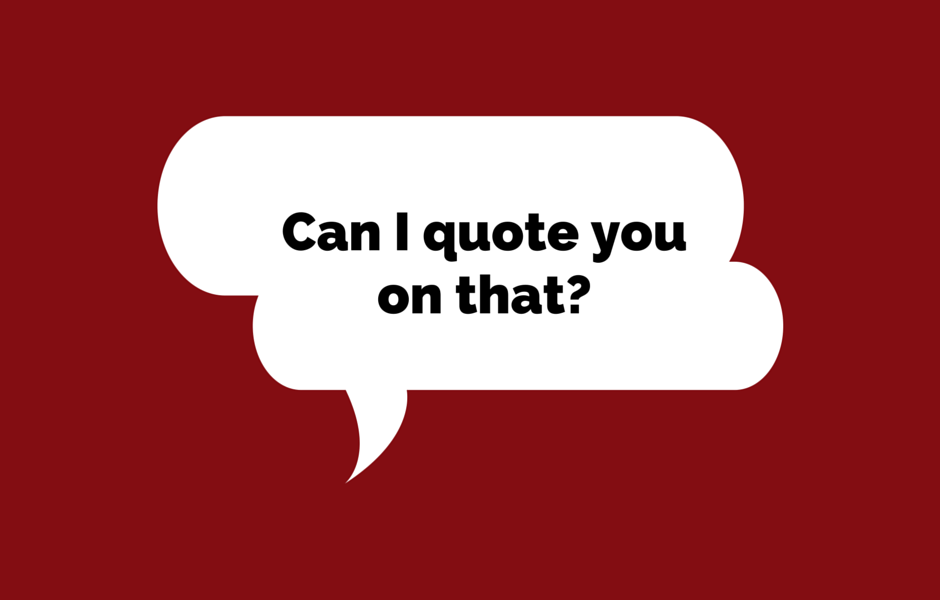Can I quote you on that?

Quotes aren’t necessary when submitting a query to an editor, which is one reason why including a good one can make a pitch really stand out.
A proposal should have the same DNA as the final story. Original reporting brings new insight and life to most articles; even if it’s a given you’ll be speaking with sources, including some quotes in the pitch itself can indicate a number of things to the editor, including:
+You’ve already done some reporting.
This isn’t one of those flabby, off-the-cuff pitches. You know your sources and subject matter.
+You have a good ear.
When a source uses vivid language, you hear and capture it.
+You can incorporate dialogue into a scene.
Even for a short piece, building a scene into your pitch is a highly effective story-telling technique that many freelance writers can’t or won’t do.
Hearing a clear, interesting voice—other than yours—early on can provide intimacy to engage the reader, which can’t be achieved by summary.
In a story about reactions to the death of Prince, compare including the impact of using this quote in the pitch or story:
“It so happens that our ambassador has a turntable, and so this morning, we played ‘Purple Rain’ and ‘Delirious’ just to get warmed up before we left the house for our important bilateral meetings,” Obama said.
instead of this:
President Obama said that he listened to “Purple Rain” and “Delirious” in the morning to get ready for his meetings in London.
So where do you find these colorful/insightful/authentic/witty quotations without spending too much time? I’m glad you asked.
Finding juicy quotes for pitches without doing full interviews
You can use any of the same reporting techniques you’d use to gather information for the final story—although in most instances you’ll want to avoid doing full interviews when you don’t have an assignment in hand. Here are a few options.
1-Give new life to darlings you’ve killed
If you interviewed three or four people for a previous article, you quite likely wound up with some material that’s interesting in its own right, but didn’t quite fit into the piece you were working on. I’ve often brought these bits back to life—think of it as compost rather than zombies—by using a good quote or two in a pitch that’s an outgrowth of the reporting for the original article.
2-Quickie pre-interviews
Requesting a short phone chat rather than a full interview might make you rethink how long you really need to spend talking to your other sources. Do your research and focus in on a couple of key questions.
If asking for an interview without an assignment in hand makes you feel a bit awkward, download the cheat sheet with sample script here.
3-Watch videos that aren’t about cats
When you initially search about a subject online, either use the “video” tab on Google, or go straight to a video search engine like YouTube. For example, I often find that a person I’m planning to interview has given a number of speeches, and watching one or two gives me information that simply isn’t easy to find in a transcript or other text. You might even include a link to the video in your pitch. If you quote one of these videos, be sure to make clear what the source was.
4-The 4Ps
Attending presentations, panel discussions, performances, and press conferences can be a great way to hear somebody focus in on a topic and possibly see them in action with others. Sometimes the context is banal, but sometimes describing the environment and reaction to it helps establish personality and/or a sense of place. Often you can ask questions directly after they speak, or else ask for a one-on-one.
Remember, it’s not necessary to include a quotation to sell a story, and a couple of good lines aren’t enough to sell a story that doesn’t otherwise have legs. Often it’s that little something extra that communicates effectively to an editor that you’re a writer they want to work with.
Need some extra tips on interviews when you don’t have an assignment in hand? Click here to download the bonus cheat sheet.

 Download a free copy of “5 Proven Steps to Writing Queries that Sell.” I hate spam and will never share your info.
Download a free copy of “5 Proven Steps to Writing Queries that Sell.” I hate spam and will never share your info.